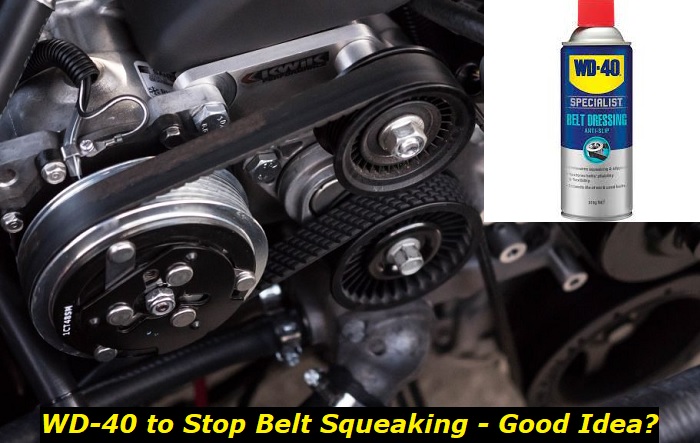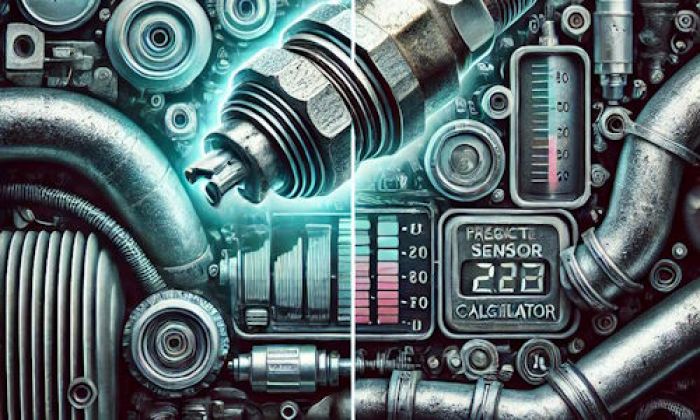The squeaking and squealing sounds in your vehicle are most likely emanating from the serpentine belt (also called the drive belt or alternator belt). When it starts slipping, the sound of this is awful and you will obviously hear it. You may have read on the internet that WD-40 can help you in this case and today, I want to tell you if it's true.
Performance additives highlights
- Efficiency:close to zero
- Availability:lots of brands and products
- Average price: $45
- Way to use:pour into gas or oil
- DIY use:yes
- Experts' advice:only biased advice
- Independent testing:negative
- Consequences:contaminated oil, changed gas properties, loss of money, no effects on performance

Why is your serpentine belt squeaking?
First of all, let's see why squeaking can occur in your belt. This is essentially slipping of your belt. It means that the belt can't rotate all the needed shafts that it is connected to. It's slipping and creating this kind of sound that is too annoying to ignore.
Also, when the belt is slipping, it's not doing its job. I mean, it's not rotating the alternator, AC compressor, steering assist pump, etc. So, all these units will not be working properly. Usually, the slipping occurs for just several seconds and then the belt starts working properly. In most cases, it happens when you start a cold car.
The squeaking sound is not only annoying. It also shows you that the vehicle has a problem that has to be solved now.
The reasons for a squeaky belt are the following:
- the belt is old and has stretched too much, so now it can't work properly;
- the tensioner is broken or has reached its maximum compensation;
- one of the components of the system is stuck and the belt can't move;
- the belt is mounted in the wrong way.
In about 90% of cases, the problem occurs because of the old and stretched belt. On its working surface, the serpentine belt has several grooves that are located along the belt. These grooves create coupling between the belt and a certain shaft. When the grooves are damaged or worn out, the belt just can't hold onto the surface of the shaft it is connected to and it fails. Exactly this creates the annoying squeaking sound that you want to get rid of.
Why is WD-40 helpless in this situation?
WD-40 is a lubricant. It's a petroleum-based lubricant that can't work well with rubber. Petroleum will slowly kill rubber and make it soft. It will even help it stretch more. You may wonder why WD-40 is so popular in solving the squeaky belt problem and why so many people use it and recommend it.
Actually, it helps you solve the issue with the sound. You lubricate the belt and it keeps slipping even better over lubricated shafts. It means that the belt will be failing even worse than earlier but without a sound. So, it may seem at first that WD-40 actually works. But this process has several downsides:
- the belt will not do its job and won't actually power your alternator, steering assist, and AC;
- the rubber belt will get extra damaged because of the petroleum-based WD-40 lubricant;
- the shafts will be lubricated with WD-40 which will make it more complicated to install the new belt;
- before repairing the car, you will need to clean every shaft from WD-40 which is not that easy.
And the only advantage you will get is that the belt will stop squeaking that loud for some time. Even this effect will not last long. Once the belt and the shafts will be hot enough because of friction, they will burn the WD-40 and will eventually start squeaking again. But now you will have to do some additional job and clean every pulley from the lubricant.
How can you fix a squeaky belt?
The only good option, in this case, is to replace the belt and the tensioner (if your engine has the tensioner for the serpentine belt). A squeaking sound means that the belt can't do its job anymore and needs to be replaced. Usually, this happens about once every 80,000 - 100,000 miles. But the belt may be damaged by some factors and may not be a good and reliable part anymore at more or less any mileage.
So, here's what you can do to solve the squealing sound issue:
- go to specialists and ask them to diagnose the drive belt system;
- they will tell you what exactly is wrong with the belt;
- buy all the needed parts for repair - prefer OEM parts if you want a long effect;
- consider if you can replace the drive belt on your own - in most cases, it's a pretty hard task though;
- if not, ask a professional in a repair shop to do this or go to the dealership;
- have the vehicle repaired and forget about the squeaking or squealing belt.
For a professional, it's not that hard to replace the drive belt, in most cases. But there are some engines with a very bad location of the belt. In some V6 or V8 cars, they will have to disassemble the entire front part of the vehicle to get to the belt pulleys and tensioner. The price for labor will highly depend on the complexity of the job.
What are some quick fixes for the squeaky belt?
The first important tip is to avoid putting anything on your belt right after you read about this on Reddit or any other "high-authority" source. Make sure that you don't lubricate the belt or try any quick DIY fixes right there and then. This may lead to breaking of the drive belt and other issues that will most likely just block your vehicle and you will have to call a tow truck to get it towed to the dealership.
Just don't touch anything under the hood - you can't fix this on the roadside.
Here are some tips on what you can do:
- just wait - the problem often occurs right when you start the engine, just let it idle for a while and the annoying sound will disappear;
- press your gas pedal a couple of times - very often, the squeaking sound occurs at low RPM but when you let the engine rev up a bit, it goes back to normal and then doesn't squeak even at idle;
- turn off the engine and get back to your car when the weather is better - less humidity and higher temperature, because the belt may react to these changes.
But all these solutions are just temporary or not efficient enough. So, in the long run, you will still need to install the new drive belt in order to solve the initial problem and let the engine work properly without these issues.
You can still use these tips to immediately stop the engine from squeaking. If they don't help, the belt is most likely dead and needs replacement as soon as possible.
Can I drive my car with a squeaky belt?
Another question I want to answer in this article is whether you may drive when you hear this awful sound from under the hood. And the quick answer is yes, you can drive whenever you hear the specific squeaky-belt sound from the engine.
This problem doesn't affect the vital parts of the vehicle but it may still trigger more dangerous errors and problems. Most likely, you will be able to drive but some units in your car may not be working properly.
Here's what happens directly at the moment when the drive belt is squeaking and slipping:
- the alternator stops working and all the systems of your car switch to the 12V battery;
- the steering assists stops working if you have hydraulic power steering;
- your AC will not work because the compressor is driven by the serpentine belt;
- the squeaking sound may go worse when you rev up the engine if the belt is completely dead and stretched.
So, driving your car is possible with a squeaky belt but not for a long time. The battery will go dead and the steering wheel will be too hard to turn. So, if the belt keeps squeaking all the time, it's better to stop the vehicle and find some other way to get it delivered to the dealership or to a repair shop.
But in most cases, you will be able to drive the car. The belt will squeak just for some time and will keep doing its job. Though, don't ignore the problem and have the vehicle fixed as soon as possible.
Final thoughts
I believe a squeaky drive belt is not a major problem in most vehicles. You can still keep driving and the belt will stop squeaking. Don't try to lubricate the belt with something or solve the issue in any other way than replacing the belt and the tensioner. Look for some professional help to get the vehicle fixed quickly and properly.
About the authors
The CarAraC research team is composed of seasoned auto mechanics and automotive industry professionals, including individuals with advanced degrees and certifications in their field. Our team members boast prestigious credentials, reflecting their extensive knowledge and skills. These qualifications include: IMI: Institute of the Motor Industry, ASE-Certified Master Automobile Technicians; Coventry University, Graduate of MA in Automotive Journalism; Politecnico di Torino, Italy, MS Automotive Engineering; Ss. Cyril and Methodius University in Skopje, Mechanical University in Skopje; TOC Automotive College; DHA Suffa University, Department of Mechanical Engineering






Add comment